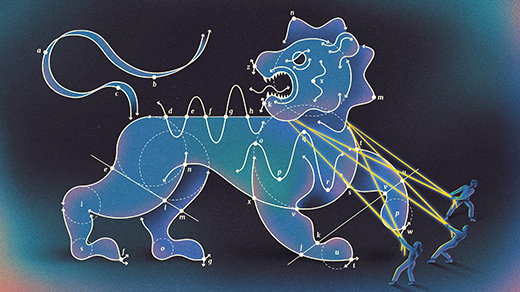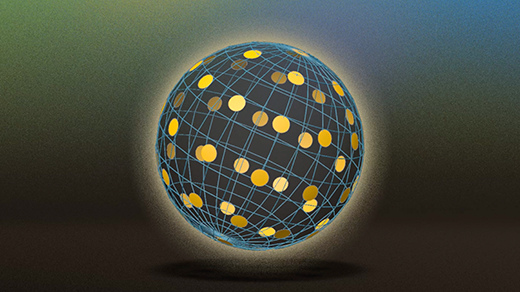Mathematical Thinking Isn’t What You Think It Is

Laurence Geai for Quanta Magazine
Introduction
David Bessis was drawn to mathematics for the same reason that many people are driven away: He didn’t understand how it worked. Unlike other creative processes, like making music, which can be heard, or painting pictures, which can be seen, math is for the most part an internal process, hidden from view. “It sounded a bit magical. I was intrigued,” he said.
His curiosity eventually led him to pursue a doctoral degree in math at Paris Diderot University in the late 1990s. He spent the next decade studying geometric group theory before leaving research mathematics and founding a machine learning startup in 2010.
Through it all, he never stopped questioning what it actually means to do math. Bessis wasn’t content to simply solve problems. He wanted to further interrogate — and help other people understand — how mathematicians think about and practice their craft.
In 2022, he published his answer — a book titled Mathematica: A Secret World of Intuition and Curiosity, which he hopes will “explain what’s going on inside the brain of someone who’s doing math,” he said. But more than that, he added, “this is a book about the inner experience of humans.” It was translated from the original French into English earlier this year.
In Mathematica, Bessis makes the provocative claim that whether you realize it or not, you’re constantly doing math — and that you’re capable of expanding your mathematical abilities far beyond what you think possible. Eminent mathematicians like Bill Thurston and Alexander Grothendieck didn’t owe their mathematical prowess to intrinsic genius, Bessis argues. Rather, they became such powerful mathematicians because they were willing to constantly question and refine their intuitions. They developed new ideas and then used logic and language to test and improve them.
According to Bessis, however, the way math is taught in school emphasizes the logic-based part of this process, when the more important element is intuition. Math should be thought of as a dialogue between the two: between reason and instinct, between language and abstraction. It’s also a physical practice of sorts, like yoga or martial arts — something that can be improved through training. It requires tapping into a childlike state and embracing one’s imagination, including the mistakes that come with it.

“The mathematician’s message is for everyone: Look at what you can do if you don’t give up on your intuition,” Bessis said.
Laurence Geai for Quanta Magazine
Everyone, Bessis says, has some experience with this process, meaning that everyone has practice thinking like a mathematician. Moreover, everyone can, and should, try to improve their mathematical thinking — not necessarily to solve math problems, but as a general self-help technique.
Quanta spoke with Bessis about what mathematicians are really doing when they’re “doing math,” and what it means for math to be a form of self-help. The interview has been condensed and edited for clarity.
Why did you write this book?
For maybe 20 years, I tried and failed to write it many, many times. Then in 2020, I reread texts that I had read a long time ago — accounts by the mathematicians René Descartes, Alexander Grothendieck and William Thurston. I realized that these three people, who were not connected to one another, were all telling the same story in different ways. That story resonated with what I had been living. After that realization, the book completely crystallized in a matter of weeks.
What we can learn from Descartes, Grothendieck and Thurston is that the nature of the mathematical process is not what people think.

At its core, Bessis says, mathematics is a game of back-and-forth between intuition and logic, instinct and reason.
Laurence Geai for Quanta Magazine
What do people think?
That math is a bunch of cryptic symbols on a piece of paper. This is what has been advertised as mathematics for millennia, because that’s what people see. But the whole journey — how you work with things in your mind, how math transforms you — is all secret. It’s not part of the curriculum.
Math is a sort of dialogue between these external and internal processes. It is the activity of aligning your inner representation — your intuition — with some logical, external representation. You use a very rigid, crazy-looking formalism to test your intuition, to recalibrate, grow and reinforce it until you feel that you have a good understanding of something.
You claim that everyone is secretly doing math, even if they don’t realize it.
You have to force them to become aware of their own mathematical training. Can you see a circle in your mind? Can you make it bigger, smaller? Can you move it around? That’s weird, you know.

“High school students are often unhappy with math, because they think it requires some innate things that they don’t have,” Bessis said. “But that’s not true; really it relies on the same type of intuition we use every day.”
Laurence Geai for Quanta Magazine
Or say I ask, “What’s a billion minus one?” I’ve never met anyone who doesn’t immediately have the answer in their head. I have to think about it when I want to say it out loud, but I see it in my mind. And I think most people are like that. Even if they don’t see it — it’s not a visual perception — they have a strong feeling of the outcome.
This is really mathematical intuition. It’s obvious to people. But it’s also historical: 2,000 years ago, nobody would have been able to easily answer this question, because they were using Roman numerals.
It proves that what you view as very easy math is actually deep math that you’ve internalized. You learned a very abstract numbering system that transformed your intuition of numbers. It makes you find things completely obvious that 2,000 years ago would have made you look like Einstein. It’s not hardwired. You wired it yourself.
Do you believe in the notion of a mathematical genius, then?
It would be dishonest to deny that there are people who are incredibly good at math. There are 5-year-olds who are already genius mathematicians. You can see it: It looks like they’re communicating with aliens from outer space.
But I do not think this is innate, even though it often manifests in early childhood. Genius is not an essence. It’s a state. It’s a state that you build by doing a certain job.
Math is a journey. It’s about plasticity. I am not saying that math is easy. Math is hard. But life, whatever you do, is extremely hard.

Bessis is inspired by the practices of mathematical greats like Bill Thurston, Alexander Grothendieck and René Descartes.
Laurence Geai for Quanta Magazine
If it’s not innate, but rather a process, does that mean that with practice I could eventually do math like Thurston?
No, not Thurston. I don’t think so. But maybe you’ll surprise me. Thurston gave a detailed account of how he decided at a young age to practice this kind of self-education every day. I don’t think you can catch up with that. Grothendieck and Descartes probably started very young, before they were even speaking.
The point I want to make is that high school students are often unhappy with math, because they think it requires some innate things that they don’t have. But that’s not true; really it relies on the same type of intuition we use every day.
So how can one get better at math?
Whenever you spot a disconnect between what your gut is telling you and what is supposed to be rational, it’s an important opportunity to understand something new. And then you can start this game of back-and-forth. Can you articulate your gut instinct and place it within a rational discussion? If there’s still a disconnect, can you visualize why? As you play that game, your imagination will gradually reconfigure. And in the end, if you’re persistent, your instinct and your reason will align, and you will be smarter. This is mathematical thinking.
What can someone gain by improving their mathematical thinking?
Joy, clarity and self-confidence.
Children do this all the time. That’s why they learn so fast. They have to. Otherwise, I mean, nothing makes sense. I think this is also why babies are super happy — because they have epiphanies all day long. It’s wonderful.

“When you do math, you’re exposed to the human thought process in a way that is really pure,” Bessis said. “It’s not just about understanding things, but about understanding things in a very childish, deep, naïve, super clear, obvious way.”
Laurence Geai for Quanta Magazine
For adults, this way of thinking can be very slow. But if you don’t give up, what you can do with your intuition is way beyond your wildest expectations. And this is universal. My book is a life lesson for all creative people, not just those who want to learn mathematical concepts. The mathematician’s message is for everyone: Look at what you can do if you don’t give up on your intuition.
Do you view this as a self-help book?
I’m actually more extreme than just saying this is a self-help book. I’m saying that, in a way, mathematics itself is a self-help technique.
How so?
Mathematicians have to be radically honest about what they don’t understand and what they think. That might help them see, for example, that an object is defined the wrong way. Or that a different definition will make a theory simpler. Or that this is not the important notion, that one is.
There’s something about honesty, about being radically candid, about trying to find ways to articulate what you really feel — it’s super hard. It takes practice.
When you do math, you’re exposed to the human thought process in a way that is really pure. It’s not just about understanding things, but about understanding things in a very childish, deep, naïve, super clear, obvious way. It’s very good training for creativity. It’s a scaffold for your imagination.
When I look at my own life, and the way I managed to overcome personal challenges, I realize that my ability to think in a mathematical way helped. From an emotional standpoint, we all need math.



